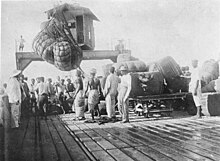From Wikipedia, the free encyclopedia
The following is a timeline of the history of the city of Lomé , Togo .
This is a dynamic list and may never be able to satisfy particular standards for completeness. You can help by with reliable sources .
Prior to 20th century [ ] 1874 - Lomé founded "by African, British and German traders."
1897 - Lomé becomes capital of German colonial Togoland . 20th century [ ] 1902 - Catholic Cathedral built.[3]
1904 - Wharf constructed.[4]
1905
1907
Kpalimé -Lomé railway and Protestant church[3]
1911 - Atakpamé -Lomé railway built.
1914 - Lomé "annexed by the British from the Gold Coast."
1920 - Lomé becomes capital of colonial French Togoland .
1920s - Boulevard Circulaire laid out.
1922 - Political "council of notables" formed.
1932
1933 - January: "Riot by women" against taxes.[7]
1955
1957 - La Vérité Togolaise newspaper begins publication.
1958 - Tokoin becomes part of Lome.
1960 - City becomes part of independent Togo .
1961 - Dynamic Togolais football club formed.
1962
Togo-Presse government newspaper begins publication.[10] Population: 80,000.[11]
1963 - 13 January: 1963 Togolese coup d'état ; Sylvanus Olympio assassinated.
1965 - Happy Star Concert Band formed.[12]
1968 - Stade Général Eyadema (stadium) opens.[citation needed
1969 - Deep-water harbor built.
1970
1975
1980 - Hotel du 2 Fevrier and West African Development Bank[15]
1981 - Population: 375,499.
1983 - British School established.
1985
1989
"Industrial and harbour free zone" established.
Dove of Peace statue unveiled in Tokoin .
1990 - 5 October: Anti-government demonstrations begin.
1991 - April: Crackdown on anti-government demonstrators.
1993 - La Dépêche newspaper begins publication.[10]
1997
Nouvel Echo newspaper begins publication.[10] Al-Furkan Center built.[15]
1998 - Bourse Régionale des Valeurs Mobilières (stock exchange) branch established.[14]
1999 - July: City hosts signing of the Lomé Peace Accord .[14]
2000 - Stade de Kégué (stadium) opens. 21st century [ ] 2001 - October: Mayor Amousouvi Akakpo arrested.[18]
2005
2007 - Musée international du Golfe de Guinée (museum) founded.[20]
2011 - Population: 1,524,000 (urban agglomeration).[21]
2012
2013 - 11 January: Lomé Grand Market fire.[23]
2015 - Population: 1,788,600 (estimate, urban agglomeration).[24] See also [ ] References [ ]
^ Jump up to: a b Thierry Lulle (1993). "Le Togo" . In Jacques Soulillou (ed.). Rives coloniales: architectures, de Saint-Louis à Douala (in French). Editions Parenthèses. ISBN 978-2-86364-056-2 ^ Komla Tallaki (2005). "Pest-Control System in the Market Gardens of Lome, Togo" . In Luc J. A. Mougeot (ed.). Agropolis: The Social, Political, and Environmental Dimensions of Urban Agriculture . International Development Research Centre . pp. 51–88. ISBN 978-1-55250-186-3 ^ Albert Frederick Calvert (1918), Togoland , London: T. W. Laurie, OL 7185419M ^ Benjamin N. Lawrance (2003), "La Révolte des Femmes: Economic Upheaval and the Gender of Political Authority in Lomé, Togo, 1931–33", African Studies Review , 46 (1): 43–67, doi :10.2307/1514980 , JSTOR 1514980 ^ "Lome" . Togo . Le Petit Futé (in French). 2010. p. 70+. ISBN 978-2-7469-3597-6 ^ "Chronology of Catholic Dioceses: Togo" . www.katolsk.no . Norway: Oslo katolske bispedømme (Oslo Catholic Diocese). Retrieved 30 September 2014 .^ Jump up to: a b c Europa World Year Book 2004 . Taylor & Francis. ISBN 978-1857432534 ^ "Population of capital cities and cities of 100,000 and more inhabitants" . Demographic Yearbook 1965 . New York: Statistical Office of the United Nations . 1966.^ Alain Ricard (1974), "Concert Party as a Genre: The Happy Stars of Lomé", Research in African Literatures , 5 (2): 165–179, JSTOR 3818671 ^ United Nations Department for Economic and Social Information and Policy Analysis, Statistics Division (1997). "Population of capital cities and cities of 100,000 and more inhabitants" . 1995 Demographic Yearbook . New York. pp. 262–321. ^ Jump up to: a b c "Togo: Directory" . Africa South of the Sahara 2004 . Regional Surveys of the World. Europa Publications . 2004. ISBN 978-1857431834 ^ Jump up to: a b "(Lome, Togo)" . ArchNet . Retrieved 30 September 2014 .^ Jump up to: a b "Togo Profile: Timeline" . BBC News . Retrieved 30 September 2014 .^ Lome mayor in corruption probe ^ Michael Kamber (5 May 2005), "Lomé Journal" , New York Times ^ "Togo: Lome" . West Africa . Lonely Planet . 2009. pp. 774–783. ISBN 978-1-74104-821-6 ^ The State of African Cities 2014 United Nations Human Settlements Programme . 2015-09-10. ISBN 978-92-1-132598-0 the original on 10 September 2014. Retrieved 30 September 2014 .^ "Togo: Police Clashes with Thousand of Protesters in Lomé" . 21 August 2012 – via Global Voices .^ Togo: le bâtiment principal du grand marché de Lomé ravagé par le feu Radio France Internationale , 12 January 2013^ "Table 8 - Population of capital cities and cities of 100,000 or more inhabitants" , Demographic Yearbook – 2018 , United Nations
This article incorporates information from the French Wikipedia .Bibliography [ ]
in English [ ] Paul Tiyambe Zeleza ; Dickson Eyoh, eds. (2003). "Lome, Togo". Encyclopedia of Twentieth-Century African History . Routledge. ISBN 978-0415234795 N. Adovi Goeh-Akue (2005). "Lomé" . In Kevin Shillington (ed.). Encyclopedia of African History . Fitzroy Dearborn. ISBN 978-1-135-45670-2 Hugues Steve Ndinga-Koumba Binza (2006). "Demographic Profiles of Libreville and Lomé" . In S.B. Bekker and Anne Leildé (ed.). Reflections on Identity in Four African Cities . South Africa: African Minds. ISBN 978-1-920051-40-2 Philippe Gervais-Lambony (2011), Simon Bekker and Goran Therborn (ed.), "Lomé" , Capital Cities in Africa: Power and Powerlessness , Dakar: Council for the Development of Social Science Research in Africa , ISBN 978-2-8697-8495-6 in French [ ] in German [ ]
External links [ ]
Wikimedia Commons has media related to Lomé
Categories :
Lomé History of Togo Timelines of cities in Africa Togo-related lists Years in Togo Timelines of capitals Hidden categories:
CS1 French-language sources (fr) Dynamic lists All articles with unsourced statements Articles with unsourced statements from September 2014 CS1 German-language sources (de) Commons category link is locally defined





 articles)
articles)